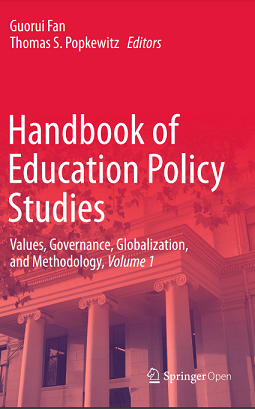
e-BOOK
Handbook of Education Policy Studies: Values, Governance, Globalization, and Methodology, Volume 1
Since the emergence of the public education system, worldwide education reforms are still in the ascendant and increasingly in remarkable progress. Reforms with a spectrum of foci, including “progressive education movement,” “curriculum and instruction reform,” “educational system reform,” “education choices,” “educational equity,” “inclusive education,” “lifelong education,” and “smart education,” have been fostering the advancement of education in countries and regions all over
the world and providing a wide range of opportunities for people from different countries, regions, and cultures to communicate with each other and learn from each other, resulting in worldwide reflection and discussion on the common challenges that education is faced with and the common value that education reforms share.
Modern education entails a continually complex set of relations with society. The study of the relationship between education and society relies on our knowledge and understanding of the relationships between the two. Over a century ago, in his review of Plato (Πλάτeων, 428/427–348/347 BC)’s education philosophy, Dewey (1916: 97) commented, “The breakdown of his philosophy is made apparent in the fact that he could not trust to gradual improvements in education to bring about a
better society which should then improve education, and so on indefinitely.” Similarly, Durkheim ([1977]2006: 166–167) believes “Educational transformation are always the result and the symptom of the social transformation in terms of which they are to be explained. In order for a people to feel at any particular moment in time the need to change its educational system, it is necessary that new ideas and needs have emerged for which the former system is no longer adequate.” It is in this
stand in view with the relationship between education and society that Dewey (1900: 20) emphasized “Whenever we have in mind the discussion of a new movement in education, it is especially necessary to take the broader, or social view.
Ketersediaan
| 051 | 379 | Website | Tersedia |
Informasi Detail
- Judul Seri
-
-
- No. Panggil
-
379
- Penerbit
- Singapore : Springer., 2020
- Deskripsi Fisik
-
xxx
- Bahasa
-
Inggris
- ISBN/ISSN
-
978-981-13-8347-2
- Klasifikasi
-
379
- Tipe Isi
-
-
- Tipe Media
-
-
- Tipe Pembawa
-
-
- Edisi
-
-
- Subjek
- Info Detail Spesifik
-
-
- Pernyataan Tanggungjawab
-
Guorui Fan
Versi lain/terkait
Tidak tersedia versi lain
Lampiran Berkas
Komentar
Anda harus login sebelum memberikan komentar
 Karya Umum
Karya Umum  Filsafat
Filsafat  Agama
Agama  Ilmu-ilmu Sosial
Ilmu-ilmu Sosial  Bahasa
Bahasa  Ilmu-ilmu Murni
Ilmu-ilmu Murni  Ilmu-ilmu Terapan
Ilmu-ilmu Terapan  Kesenian, Hiburan, dan Olahraga
Kesenian, Hiburan, dan Olahraga  Kesusastraan
Kesusastraan  Geografi dan Sejarah
Geografi dan Sejarah